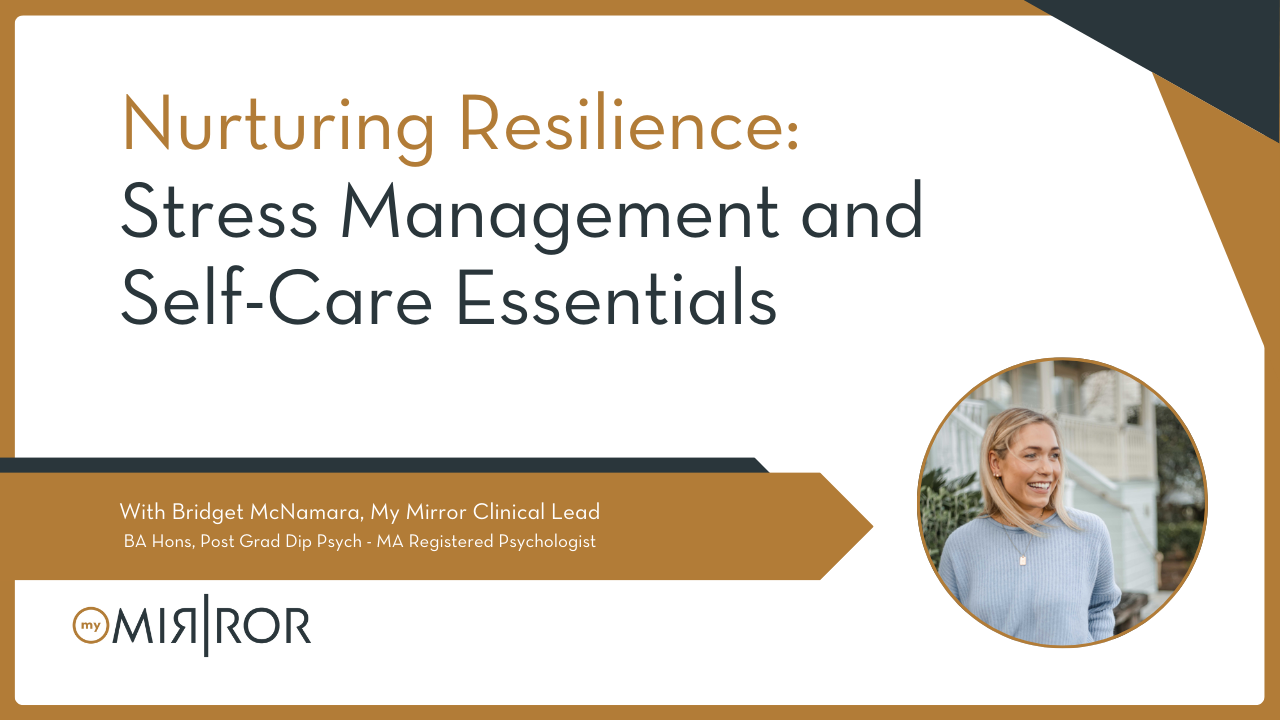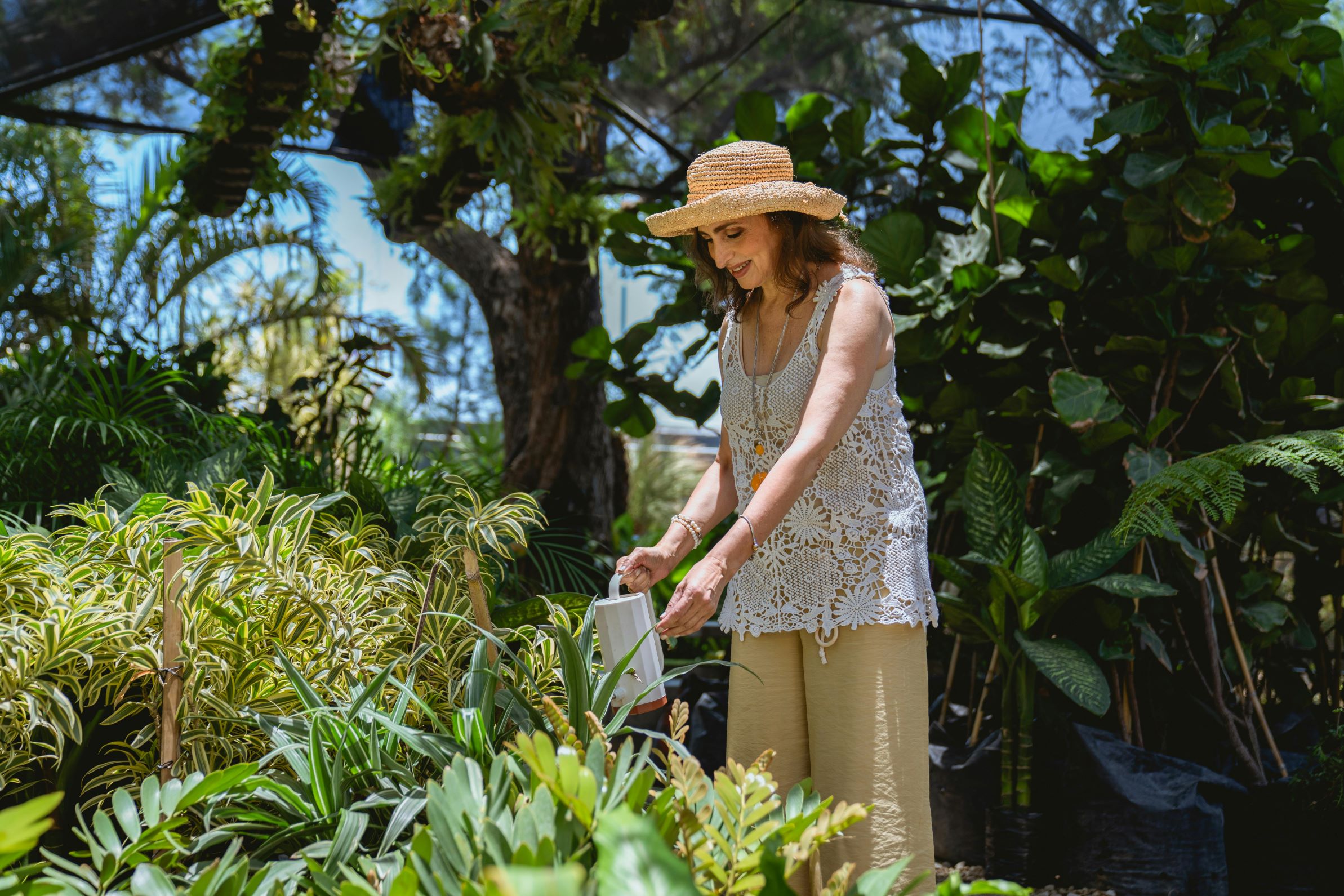Are you looking for practical ways to manage stress, build resilience, and prioritize self-care? In Nurturing Resilience: Stress Management and Self-Care Essentials, you’ll discover valuable strategies to help you navigate life’s challenges and improve your mental well-being. Whether you’re feeling overwhelmed or just seeking balance, this session offers the tools you need to thrive.
Watch now and take the first step toward a healthier, more balanced life!

In today’s high-pressure world, stress is something that most of us deal with regularly. Whether it's due to the demands of work, personal relationships, or constantly being bombarded by updates and information from our digital devices, stress can easily take over. One of the key factors that helps us manage stress effectively lies in the practice of real, meaningful self-care. But what exactly is self-care, and how can it help us feel better and handle stress more effectively?

The Importance of Authentic Self-Care
Although it’s a common term, self-care is often misunderstood. Many think it is something indulgent, a massage, or a treat yourself moment. And while these kinds of activities can form part of a person’s self-care practice, the concept of self-care goes much deeper than that. Authentic self-care is also about being intentional with your actions and protecting your mental, physical and emotional well-being. It can involve understanding your needs and taking intentional action to meet those needs, either in times of crisis or as regular acts in your daily life.
Beyond having a facial or getting your nails done, self-care can involve the creation of boundaries, healthy habits or cultivating routines and practices that enhance your well-being. This could include prioritising rest and recovery, saying “no” or any other activity that brings you energy, or a sense of fulfilment. Engaging in effective self-care (consistently) can help reduce stress, prevent burnout and we are better equipped to face life's challenges.

The Relationship Between Self-Care and Stress
It's normal for us all to experience stress at some point in our lives. It’s a natural response when faced with a challenge or demand. In fact, a small amount of stress can be beneficial, as it motivates us to take action. However, when stress persists over long periods, it can be harmful to our health and well-being. Chronic stress has been linked to issues like depression, anxiety, reduced immunity, and even heart disease.
Incorporating self-care strategies is essential for managing and reducing stress. Practising mindfulness, setting firm boundaries, and prioritizing rest and relaxation are all key self-care tips that help create balance. When we have clear strategies in place to take care of ourselves, we are better equipped to handle challenges and bounce back from setbacks.

Self-Care Tips for Creating a Consistent Routine for Mindful Living
Implement a Structured Routine for Optimal Self-Care
One effective way to incorporate self-care into your life is to set up a routine. When something is part of your routine it becomes expected, and we are more likely to commit or remember to do it. To set a good routine or structure to your self-care you could wake up 15 minutes early each day or set a reminder in your calendar to complete activities that promote relaxation. Examples include deep breathing exercises, meditation, reading a book, doing a word puzzle, or exercising. A consistent routine can also help remind your brain that it’s time to unwind, which makes it easier to manage periods of stress.
How Setting Boundaries Helps You Protect Your Energy
Learning how to set boundaries is a crucial element of managing stress. It’s important that people learn how to say no when necessary. Being able to say no helps you protect and prioritise your time and energy. Saying no could be in the context of setting limits with work, engaging in certain social obligations or other demands on your time and energy.
Creating a Sleep-Friendly Environment for Restful Nights
Sleep is crucial to your general health and well-being. When we don’t get enough sleep it’s hard to manage our emotions, we aren’t focussed, and we can experience health concerns and increased stress as a result. To get a good sleep try to focus on getting enough sleep, but also improving your quality of sleep. Sleep hygiene is a great way to set yourself up for a good sleep – so consider things like; getting enough sunlight in the day, exercising, turning off screens in the hours before bed, reducing or ceasing caffeine, and alcohol use before bedtime and following a relaxing winddown routine to signal to your body that it’s time for bed.
The Role of Nutrition and Movement
It's important to put the right food into your body to prioritise your general health and well-being. Certain foods or drinks (particularly sugar, caffeine and alcohol) can influence how you feel and even your mood. In addition to what you consume, you can look after your body by exercising. When you exercise it releases endorphins which help reduce cortisol (known as the stress hormone) in the body. It's important to find time each day to move your body which could include walking, yoga, weights or a more intense workout. It's not so much the intensity that matters, more so having an activity you enjoy and can regularly commit to as part of your self-care routine that can have an impact.
The Stress-Reducing Benefits of Mindfulness Practice
Mindfulness involves paying attention to the present moment without judgment. When you practice mindfulness, it can help reduce stress as you aren’t worried about the future, or something that has happened in the past. Instead, you are focussed on what’s happening right here, right now. Mindfulness exercises can include things like deep breathing, body scans or meditation.
Building a Healthy Social Network for Emotional Well-Being
Having social support is a vital element of self-care. When you spend time and connect with loved ones it can provide emotional support, reduce feelings of isolation and when periods of stress arise you know you have people you can turn to for support. Ensure that you nurture relationships that a mutually beneficial and healthy.
Nurture Your Soul: How Self-Compassion Leads to Inner Wellbeing
Self-care isn’t just about doing nice things for your body, it’s also about doing nice things for your “mind”. Self-care should involve self-compassion and treating yourself with kindness. People are often hard on themselves and have high expectations or even perfectionist traits. When you feel stressed, it’s easy to be hard on yourself or fall into patterns of negative thoughts. Instead, try to practice self-compassion. This could look like; being realistic with the expectations you put on yourself, allowing yourself to take breaks, acknowledging that it's normal to struggle at times, and also consider what you would say to a loved one in the same situation and see if you can apply this kindness to yourself.

Self-care is unique for each individual, and what works in a self-care routine can vary from person to person. As your needs change over time, it's important to recognise that your self-care practices should evolve too. Incorporating practical self-care tips can help you adapt your routine to meet your current mental, physical, and emotional needs. This means that you need to give your well-being attention and commitment. If you can regularly incorporate self-care into your daily life, it helps create resilience which helps you manage life’s ups and downs and periods of stress you may be experiencing. Remember self-care is essential, it's not selfish. When you prioritise your wellbeing and self-care is non-negotiable it better equips you to care for others and yourself.
